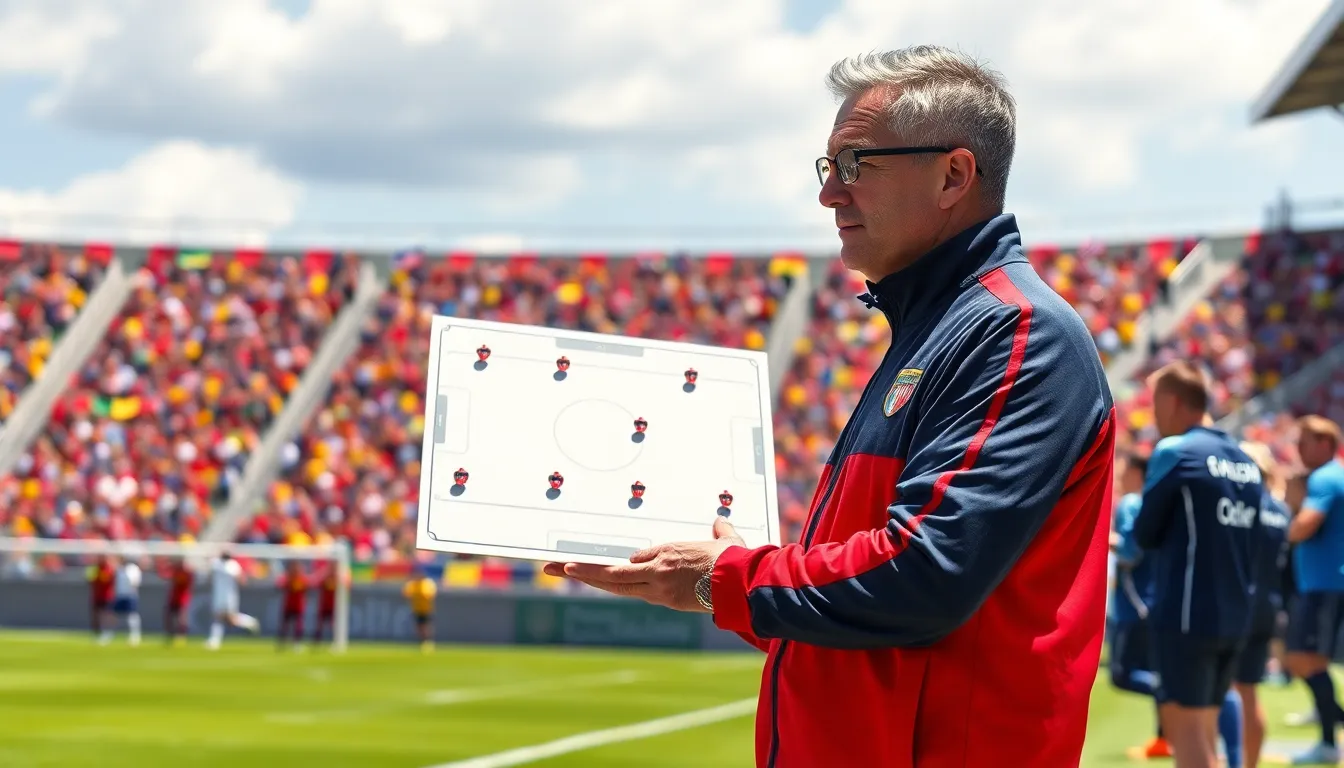In the world of soccer, FIFA strategies are the secret sauce behind every winning team. Imagine a chess match played on a field where players dribble, pass, and shoot their way to glory. It’s not just about kicking a ball; it’s about outsmarting the opponent at every turn. Whether it’s the art of counter-attacking or the finesse of possession play, these strategies can turn an underdog into a champion faster than you can say “goal!”
Overview of FIFA Strategies
FIFA strategies play a crucial role in the success of teams, focusing on tactics that maximize performance and minimize weaknesses. Understanding these strategies is essential for any team aiming to improve their game.
Importance of Strategic Planning
Strategic planning shapes how teams approach matches. Identifying strengths allows coaches to exploit opponents’ weaknesses effectively. Creating recognizable formations enhances team’s cohesiveness and communication on the pitch. Tactical flexibility grants teams adaptability to different scenarios, leading to successful outcomes in varied match situations. Teams relying solely on individual skill often fall short against well-structured opponents. Strong strategic frameworks elevate teams, enabling consistent results.
Historical Context of FIFA Strategies
FIFA strategies evolved significantly throughout history. The tactical shift in the 1970s, marked by total football, illustrated the importance of fluid movements and positional interchange. By the 1990s, the emergence of counter-attacking strategies reflected the need for quick transitions. Winning teams adapted their game plans to include tighter defensive structures coupled with fast breaks. Notable tournaments showcased teams implementing innovative strategies that changed the course of matches. Understanding these historical contexts provides insights into modern tactical approaches employed today.
Key Components of FIFA Strategies

FIFA strategies involve critical elements that shape successful teams and their performance. Understanding how these components function provides insight into effective gameplay.
Governance and Structure
Strong governance defines the structure within FIFA organizations. Leadership roles ensure accountability and adherence to rules. Regulatory bodies oversee compliance, maintaining fair play standards. Decision-making processes facilitate efficient communication among team members. Through collaboration, teams can improve strategic planning and operational effectiveness. Transparent governance builds trust among stakeholders, fostering a positive environment for development.
Financial Management
Effective financial management plays a vital role in FIFA strategies. Budgets outline spending limits, ensuring resources align with strategic goals. Revenue generation methods, such as sponsorships and ticket sales, contribute to financial stability. Expense tracking allows teams to allocate funds strategically, enhancing performance. Investing in player development and facilities ensures long-term growth. Financial transparency reinforces credibility, attracting additional investment and support.
Competitive Strategies Employed by FIFA
FIFA employs various competitive strategies to enhance global soccer engagement and success. These strategies focus on tournament organization and partnership dynamics.
Tournament Organization
Effective tournament organization proves essential for FIFA’s success. FIFA establishes regulations that promote transparency and fairness, ensuring equal conditions for participating teams. Scheduling matches at optimal times maximizes viewership and fan engagement. Significant events like the World Cup showcase FIFA’s capacity for logistical management, involving coordination among several stakeholders. UEFA Euro serves as another example, highlighting the emphasis on safety, fan experience, and facilities. Broadly, these organized tournaments create lucrative opportunities for teams and sponsors while elevating competitiveness on an international stage.
Partnership and Sponsorship Strategies
FIFA’s partnership and sponsorship strategies drive revenue and enhance brand reputation. Strategic collaborations with brands such as Coca-Cola and Visa underscore FIFA’s commitment to global outreach. These partnerships capitalize on aligning with broadly recognized companies, expanding FIFA’s market reach. Advertising campaigns connect sponsors with passionate soccer fans, creating memorable experiences. Use of major events like the World Cup facilitates long-term partnerships, ensuring stable revenue streams. Consequently, FIFA focuses on building mutual benefits that enhance its strategic position in the sports industry.
Challenges Facing FIFA Strategies
FIFA strategies encounter numerous challenges that affect the effectiveness of soccer management globally. Key issues span from corruption scandals to global political influences.
Corruption and Scandals
Corruption poses a significant threat to FIFA’s integrity. Past scandals, like the 2015 indictment of FIFA officials, revealed systemic issues within the organization. These events have eroded trust and sparked calls for reform. Maintaining transparency becomes crucial for restoring confidence among fans and stakeholders. Efforts to implement stricter regulations and oversight can help address these issues. FIFA’s commitment to ethical governance remains vital in overcoming corruption.
Global Political Influences
Political dynamics heavily influence FIFA’s operations. Governments often leverage sports for diplomatic purposes, impacting decisions on hosting tournaments. National interests sometimes conflict with FIFA’s regulatory framework. Tensions arise when political agendas overshadow fair play principles. Supporting independent governance helps safeguard soccer from political manipulation. Recognizing these influences allows FIFA to strategize more effectively in managing global relationships.
Future Directions of FIFA Strategies
Future FIFA strategies focus on embracing innovation and enhancing global reach. These directions ensure continued growth and engagement in soccer worldwide.
Innovation in Technology
Emerging technologies increasingly shape FIFA strategies. Video Assistant Referee technology helps maintain fairness in matches through real-time decision-making support. Data analytics plays a crucial role in performance evaluation, enabling teams to fine-tune tactics based on historical and current data. Wearable technology improves player health by monitoring fitness levels and reducing injury risks, directly impacting team performance. Additionally, virtual reality training aids player skill development through immersive simulations, preparing them better for actual match conditions. These advancements create a more dynamic and strategic approach to the game.
Enhancing Global Reach
Enhancing global reach remains vital for FIFA’s future. Expanding grassroots programs fosters local talent development, ensuring a broader player base emerges. Strategic partnerships with media outlets enhance engagement, bringing more matches to diverse audiences. Continued efforts in promoting women’s soccer elevate its status and inspire participation worldwide. Engaging underrepresented regions in tournaments helps diversify the global soccer community, driving international growth. Increasing access to the sport through technology and local events ensures soccer remains relevant on a global scale. These strategic initiatives help solidify FIFA’s leadership in the sports industry.
FIFA strategies play a pivotal role in shaping the landscape of soccer. They encompass not just the tactical maneuvers on the field but also the governance and financial frameworks that support the sport’s growth. As teams adapt to emerging technologies and innovative practices, the focus on transparency and ethical management becomes increasingly vital.
The ongoing evolution of strategies ensures that FIFA remains at the forefront of global soccer, addressing challenges while fostering engagement and inclusivity. By prioritizing grassroots development and embracing new opportunities, FIFA can secure its position as a leader in the sports industry for years to come.







